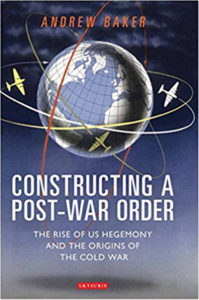
Constructing a Post-war Order: The Rise of US Hegemony and the Origins of the Cold War
Andrew Baker
I.B.Tauris (2011)
Rs10,901
The years 1942 to 1946 saw the acceleration of World War II, its conclusion and the construction of a post-war order that was to culminate in the Cold War. Andrew Baker examines the expansion of US political and economic power and hegemony during this period, and the extent to which smaller states, particularly Australia, New Zealand, Canada and South Africa, contested this expansion. Through successfully outlining and defending their own notions of sovereignty, property and commercial rights, they were able to a make a significant contribution towards fashioning a post-war framework more conducive to states than empires. This analysis of the period immediately after World War II will appeal to researchers of history and international relations, as well as those interested in the political economy of the post-war world.
Andrew Baker teaches History at the Universities of Hertfordshire and Buckingham. He holds a DPhil from the University of Oxford.
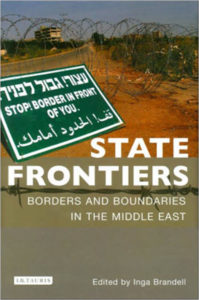
State Frontiers: Borders and Boundaries in the Middle East
Inga Brandell
I.B.Tauris (2006)
Rs8,244
In recent times, the question of borders in the Middle East has assumed an importance unknown since the collapse of the Ottoman Empire. In this fresh examination of the issue, Inga Brandell draws together a variety of disciplinary approaches, and takes the classic debates forward into the 21st century. From the Syrian-Lebanese border, which is “straddled” by a shifting business community, to the Greek-Turkish border in Cyprus, which has dramatically altered not only the geographical but also the social experience of living there.
Inga Brandell is an associate professor in the Department of Politics at the University of Uppsala.
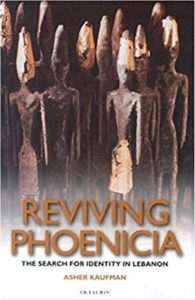
Reviving Phoenicia: The Search for Identity in Lebanon
Asher Kaufman
I.B.Tauris (2014)
Rs8,244
Reviving Phoenicia follows the social, intellectual and political development of the Phoenician myth of origin in Lebanon from the middle of the nineteenth century to the end of the twentieth. Asher Kaufman demonstrates the role played by the lay, liberal Syrian-Lebanese who resided in Beirut, Alexandria and America towards the end of the nineteenth century in the birth and dissemination of this myth. Kaufman investigates the crucial place Phoenicianism occupied in the formation of Greater Lebanon in 1920. He also explores the way the Jesuit Order and the French authorities propagated this myth during the mandate years. The book also analyzes literary writings of different Lebanese who advocated this myth, and of others who opposed it. Finally, Reviving Phoenicia provides an overview of Phoenicianism from independence in 1943 to the present, demonstrating that despite the general objection to this myth, some aspects of it entered mainstream Lebanese national narratives. Kaufman’s work will be vital reading for anyone interested in the birth of modern Lebanon as we know it today.
Asher Kaufman is associate professor of peace studies and director of doctoral studies at the Joan B. Kroc Institute for International Peace Studies, University of Notre Dame. He previously taught at the Hebrew University, Jerusalem and was a research fellow at the Harry S. Truman Research Institute for the Advancement of Peace. Kaufman is the author of Contested Frontiers: Cartography, Sovereignty and Conflict at the Syria, Lebanon, Israel Tri-Border Region.
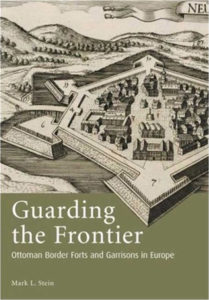
Guarding the Frontier: Ottoman Border Forts and Garrisons in Europe
Mark L. Stein
I.B.Tauris (2007)
Rs8,702
The seventeenth-century Ottoman-Habsburg frontier was the scene of chronic conflict. The defences of both empires were based on a line of fortresses, spanning the border. Mark Stein gives us a fascinating insight into everyday life on the frontier in this turbulent time in Ottoman history, by investigating the social, economic, and military aspects of Ottoman forts and garrisons in a new comparative approach. Drawing on a wide range of Ottoman and Western archival and narrative sources, “Guarding the Frontier” assesses the state of early-modern Ottoman military architecture and siegecraft; and, carefully dissects the Ottomans’ ability to besiege, defend, build, and repair fortifications in the seventeenth century, as well as the relationship between the central and provisional administrations. This thorough overview includes an assessment of the empire’s ability to marshal the manpower and supply requirements for lengthy sieges; a survey of Ottoman artillery; and the procedures involved in building and maintaining frontier forts.
Studying an extensive database compiled from seventeenth-century garrison payroll records, Stein paints a fascinating description of the various types of troops who served on the Ottoman-Habsburg frontier: slave and levied soldiers, cavalry and infantry, Muslims and Christians, charged with defending the Ottoman Empire at this fascinating point in History.
Mark L. Stein is assistant professor of history at Muhlenberg College, Pennsylvania.
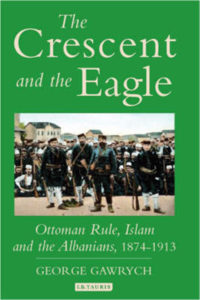
The Crescent and the Eagle: Ottoman Rule, Islam and the Albanians (1874-1913)
George Gawrych
I.B.Tauris
“The Crescent and the Eagle” examines the awakening of Albanian national identity from the end of the 19th century to the outbreak of the First World War - a period of intense nationalism in the Balkans - from an Ottoman perspective. Drawing on Ottoman and European archival material, the book undermines the customary negative stereotypes of Ottoman rule, offering a more nuanced interpretation. Gawrych provides a critical but objective examination of the evolution of government policies toward Albanians, from attempts to mould them into an “iron barrier” to the establishment of a uniform system of administration. He argues that this was a result of a complicated set of conflicting allegiances and identities, rather than a simply adversarial struggle between government imposition of policy and Albanian resistance. The author also analyses the general problems of endemic violence and misadministration at the provincial level, and examines Albanian efforts to gain nationality rights and maintain local privileges and tribal autonomy.
Weaving his analysis of these events into a chronological framework, he concludes that Albanian independence resulted from a confluence of foreign and domestic developments rather than from the design and will of the Albanians themselves. This stimulating study offers many fresh insights into the dynamics of power within the Ottoman Empire and contributes a new perspective to the study of the development of Albanian nationalism.
George W. Gawrych is associate professor of Middle East History at Baylor University. He is the author of The Albatross of Decisive Victory: War and Policy between Egypt and Israel in the 1967 and 1973 Arab-Israeli Wars and co-author of Armed Peacekeepers in Bosnia. He has written numerous articles about the history of Turkey and the Middle East and in 1989 he won the Biennial Award for the Best Published Article in Turkish Studies, awarded by the Turkish Studies Association of North America.

